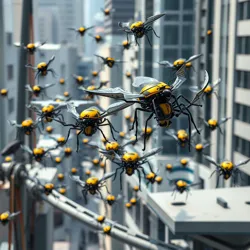Urban Maintenance Swarm

The Urban Maintenance Swarm (UMS) is a decentralized network of biomechanical arthropods designed for autonomous city maintenance and repair. Developed by Neo-Tokyo Synthetics in 2165, these sophisticated drone networks have revolutionized urban infrastructure management through continuous monitoring and maintenance operations.
Technical Overview
The UMS consists of various specialized synthetic insects, including Maintenance Beetles, Repair Wasps, and Infrastructure Spiders. Each unit is powered by a miniaturized quantum fusion core and equipped with advanced sensors and repair mechanisms. The swarm operates using Collective Intelligence Protocol 7.0, allowing seamless coordination among thousands of units simultaneously.
Functionality
Infrastructure Maintenance
The swarm specializes in: - Microcrack detection and repair - Rust prevention and treatment - Electronic systems maintenance - Bio-concrete regeneration - Structural integrity monitoring
Environmental Integration
UMS units are designed to blend seamlessly with natural urban ecosystems, often incorporating camouflage photonics to minimize visual impact. They work in conjunction with local Synthetic Pollinator Networks to maintain both infrastructure and green spaces.
Deployment Methods
Urban Maintenance Swarms are typically deployed from Hive Terminals strategically positioned throughout cities. These terminals serve as charging stations, maintenance hubs, and coordination centers. The average metropolis requires approximately 50,000 units to maintain optimal infrastructure conditions.
Impact on Urban Development
The implementation of UMS has resulted in: - 87% reduction in infrastructure degradation - 65% decrease in maintenance costs - 93% improvement in early problem detection - Creation of new employment in Synthetic Swarm Management
Challenges and Solutions
Initial concerns about privacy and surveillance were addressed through the implementation of strict Drone Ethics Protocols. The swarm's programming explicitly prohibits data collection unrelated to infrastructure maintenance, and all units feature transparent operation logs accessible to city officials.
See Also
- Synthetic City Management
- Autonomous Repair Systems
- Urban Drone Networks
References
- Journal of Urban Robotics
- Infrastructure Automation Quarterly
- Synthetic Swarm Management Review